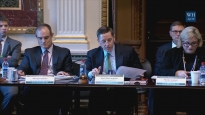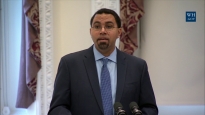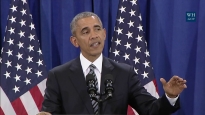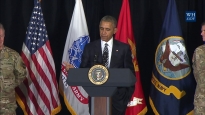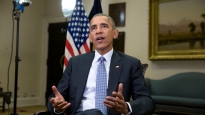Creating the White House Council on Women & Girls
March 11, 2009 | 10:25
President Obama signed an Executive Order creating the White House Council on Women and Girls on March 11, 2009. Chaired by Valerie Jarrett, the Council will provide a coordinated federal response to the challenges confronted by women and girls and to ensure that all Cabinet and Cabinet-level agencies consider how their policies and programs impact women and families. (public domain)
Remarks by the President at Signing of Executive Order Creating the White House Council on Women and Girls
THE WHITE HOUSE
Office of the Press Secretary
____________________________________________________________
Office of the Press Secretary
____________________________________________________________
For Immediate Release March 11, 2009
REMARKS BY THE PRESIDENT
AT SIGNING OF EXECUTIVE ORDER
CREATING THE WHITE HOUSE COUNCIL ON WOMEN AND GIRLS
AT SIGNING OF EXECUTIVE ORDER
CREATING THE WHITE HOUSE COUNCIL ON WOMEN AND GIRLS
East Room
1:31 P.M. EDT
THE PRESIDENT: Thank you so much. Well, today, as we continue our celebration of International Women's History Month, I'm proud to sign this executive order establishing the women's -- the White House Council on Women and Girls. It's a Council with a mission that dates back to our founding: to fulfill the promise of our democracy for all our people.
I sign this order not just as a President, but as a son, a grandson, a husband, and a father, because growing up, I saw my mother put herself through school and follow her passion for helping others. But I also saw how she struggled to raise me and my sister on her own, worrying about how she'd pay the bills and educate herself and provide for us.
I saw my grandmother work her way up to become one of the first women bank vice presidents in the state of Hawaii, but I also saw how she hit a glass ceiling -- how men no more qualified than she was kept moving up the corporate ladder ahead of her.
I've seen Michelle, the rock of the Obama family -- (laughter) -- juggling work and parenting with more skill and grace than anybody that I know. But I also saw how it tore at her at times, how sometimes when she was with the girls she was worrying about work, and when she was at work she was worrying about the girls. It's a feeling that I share every day.
In so many ways, the stories of the women in my life reflect the broader story of women in this country -- a story of both unyielding progress and also untapped potential.
Today, women make up a growing share of our workforce and the majority of students in our colleges and our law schools. Women are breaking barriers in every field, from science and business to athletics and the Armed Forces. Women are serving at the highest levels of my administration. And we have Madam Speaker presiding over our House of Representatives. (Applause.) I had the privilege of participating in a historic campaign with a historic candidate, who we now have the privilege of calling Madam Secretary.
But at the same time, when women still earn just 78 cents for every dollar men make; when one in four women still experiences domestic violence in their lifetimes; when women are more than half of our population, but just 17 percent of our Congress; when women are 49 percent of the workforce, but only 3 percent of our Fortune 500 CEOs -- when these inequalities stubbornly persist in this country, in this century, then I think we need to ask ourselves some hard questions. I think we need to take a hard look at where we're falling short, and who we're leaving out, and what that means for the prosperity and the vitality of our nation.
And I want to be very clear: These issues are not just women's issues. When women make less than men for the same work, it hurts families who find themselves with less income, and have to work harder just to get by. When a job doesn't offer family leave, that also hurts men who want to help care for a new baby or an ailing parent. When there's no affordable child care, that hurts children who wind up in second-rate care, or spending afternoons alone in front of the television set.
And when any of our citizens cannot fulfill their potential because of factors that have nothing to do with their talent, their character, their work ethic, that says something about the state of our democracy. It says something about whether we're honoring those words put on paper more than two centuries ago -- whether we're doing our part, like generations before us, to breathe new life into them in our time.
That, above all, is the true purpose of our government. Not to guarantee our success, but to ensure that in America, all things are still possible for all people. Not to solve all our problems, but to ensure that we all have the chance to pursue our own version of happiness. To give our daughters the chance to achieve as greatly as the women who join us today. That's the impact our government can have.
It's the impact of a Health and Human Services Department that funds research by women like Dr. Nina Fedoroff, a biotechnology and life science pioneer -- (applause) -- who won the National Medal of Science in 2006. It's the impact of a Defense Department that works to recruit and promote women -- women, so that women like Sergeant Major Michele Jones, who was the Army's highest ranking enlisted woman before she retired, can strengthen our military with their leadership. (Applause.)
It's the impact of a Department of Education that enforces Title IX, so athletes like -- (applause) -- so athletes like Olympic gold medalist Dominique Dawes and Lisa Leslie -- (applause) -- have a level playing field to compete and to win. It's the impact of a White House and a Congress that fight for legislation like the Lilly Ledbetter Fair Pay Restoration Act, so that all women can get paid what they deserve. (Applause.) I'm very proud this was the very first bill that I signed into law.
And that's why I'm establishing this Council -- not just to continue efforts like these, but to enhance them. The Council will be composed of the heads of every Cabinet and Cabinet-level agency, and will meet on a regular basis. We have many of those Cabinet members here. Some of the men showed up -- we put them in the second row. (Laughter.) But they're going to be fighting -- (applause) -- they're going to be part of this Council, and it's going to meet on a regular basis.
Its purpose is very simple: to ensure that each of the agencies in which they're charged takes into account the needs of women and girls in the policies they draft, the programs they create, the legislation they support. It's not enough to only have individual women's offices at individual agencies, or only have one office in the White House. Rather, as former Secretary of State Madeleine Albright once said, in our government, "¼responsibility for the advancement of women is not the job of any one agency, it's the job of all of them." (Applause.) And she should know -- she helped lead an interagency women's initiative during the Clinton administration.
At the same time, given the critical importance of its work, this Council must have strong leadership from the White House, and direct accountability to me. And that's why I'm appointing Valerie Jarrett, one of my closest advisors and most senior members of my administration, to lead it. Tina Tchen, another senior member of my White House staff, will serve as the Council's Executive Director.
In the end, while many of the challenges women and girls face are new, the work of this Council is not -- it's been with us for generations. Frances Perkins, who was President Franklin Roosevelt's Secretary of Labor, and the first woman to serve in the Cabinet -- a great hero of the New Deal -- described it well when she said, "¼I had a kind of duty to other women to walk in and sit down on the chair that was offered, and so establish the rights of others long hence and far distant in geography to sit in the high seats." To sit in the high seats.
That is why I'm standing here today, because of what my mother and grandmother did for me, because of their hard work and sacrifice and unflagging love. That's what Michelle is doing right now, thinking every day about making sure that Malia and Sasha have the same opportunities as anybody's sons do. That's why so many of us are here today, because of the women who came before us, who were determined to see us sit in the high seats: women who reached for the ballot, and raised families, and traveled long, lonely roads to be the first in the boardroom or in the courtroom or on the battlefield and in the factory floor; women who cracked and shattered those glass ceilings, so that my daughters -- and all of our sons and daughters -- could dream a little bigger and reach a little higher.
So now it's up to us to carry that work forward, to ensure that our daughters and granddaughters have no limits on their dreams, no obstacles to their achievements -- and that they have opportunities their mothers and grandmothers and great grandmothers never dreamed of. That's the purpose of this Council. Those are the priorities of my presidency. And I look forward to working with all of you to fulfill them in the months and years to come.
All right, so I'm going to go sign this thing. Thank you very much. (Applause.)
(The executive order is signed.) (Applause.)
END
1:39 P.M. EDT
I sign this order not just as a President, but as a son, a grandson, a husband, and a father, because growing up, I saw my mother put herself through school and follow her passion for helping others. But I also saw how she struggled to raise me and my sister on her own, worrying about how she'd pay the bills and educate herself and provide for us.
I saw my grandmother work her way up to become one of the first women bank vice presidents in the state of Hawaii, but I also saw how she hit a glass ceiling -- how men no more qualified than she was kept moving up the corporate ladder ahead of her.
I've seen Michelle, the rock of the Obama family -- (laughter) -- juggling work and parenting with more skill and grace than anybody that I know. But I also saw how it tore at her at times, how sometimes when she was with the girls she was worrying about work, and when she was at work she was worrying about the girls. It's a feeling that I share every day.
In so many ways, the stories of the women in my life reflect the broader story of women in this country -- a story of both unyielding progress and also untapped potential.
Today, women make up a growing share of our workforce and the majority of students in our colleges and our law schools. Women are breaking barriers in every field, from science and business to athletics and the Armed Forces. Women are serving at the highest levels of my administration. And we have Madam Speaker presiding over our House of Representatives. (Applause.) I had the privilege of participating in a historic campaign with a historic candidate, who we now have the privilege of calling Madam Secretary.
But at the same time, when women still earn just 78 cents for every dollar men make; when one in four women still experiences domestic violence in their lifetimes; when women are more than half of our population, but just 17 percent of our Congress; when women are 49 percent of the workforce, but only 3 percent of our Fortune 500 CEOs -- when these inequalities stubbornly persist in this country, in this century, then I think we need to ask ourselves some hard questions. I think we need to take a hard look at where we're falling short, and who we're leaving out, and what that means for the prosperity and the vitality of our nation.
And I want to be very clear: These issues are not just women's issues. When women make less than men for the same work, it hurts families who find themselves with less income, and have to work harder just to get by. When a job doesn't offer family leave, that also hurts men who want to help care for a new baby or an ailing parent. When there's no affordable child care, that hurts children who wind up in second-rate care, or spending afternoons alone in front of the television set.
And when any of our citizens cannot fulfill their potential because of factors that have nothing to do with their talent, their character, their work ethic, that says something about the state of our democracy. It says something about whether we're honoring those words put on paper more than two centuries ago -- whether we're doing our part, like generations before us, to breathe new life into them in our time.
That, above all, is the true purpose of our government. Not to guarantee our success, but to ensure that in America, all things are still possible for all people. Not to solve all our problems, but to ensure that we all have the chance to pursue our own version of happiness. To give our daughters the chance to achieve as greatly as the women who join us today. That's the impact our government can have.
It's the impact of a Health and Human Services Department that funds research by women like Dr. Nina Fedoroff, a biotechnology and life science pioneer -- (applause) -- who won the National Medal of Science in 2006. It's the impact of a Defense Department that works to recruit and promote women -- women, so that women like Sergeant Major Michele Jones, who was the Army's highest ranking enlisted woman before she retired, can strengthen our military with their leadership. (Applause.)
It's the impact of a Department of Education that enforces Title IX, so athletes like -- (applause) -- so athletes like Olympic gold medalist Dominique Dawes and Lisa Leslie -- (applause) -- have a level playing field to compete and to win. It's the impact of a White House and a Congress that fight for legislation like the Lilly Ledbetter Fair Pay Restoration Act, so that all women can get paid what they deserve. (Applause.) I'm very proud this was the very first bill that I signed into law.
And that's why I'm establishing this Council -- not just to continue efforts like these, but to enhance them. The Council will be composed of the heads of every Cabinet and Cabinet-level agency, and will meet on a regular basis. We have many of those Cabinet members here. Some of the men showed up -- we put them in the second row. (Laughter.) But they're going to be fighting -- (applause) -- they're going to be part of this Council, and it's going to meet on a regular basis.
Its purpose is very simple: to ensure that each of the agencies in which they're charged takes into account the needs of women and girls in the policies they draft, the programs they create, the legislation they support. It's not enough to only have individual women's offices at individual agencies, or only have one office in the White House. Rather, as former Secretary of State Madeleine Albright once said, in our government, "¼responsibility for the advancement of women is not the job of any one agency, it's the job of all of them." (Applause.) And she should know -- she helped lead an interagency women's initiative during the Clinton administration.
At the same time, given the critical importance of its work, this Council must have strong leadership from the White House, and direct accountability to me. And that's why I'm appointing Valerie Jarrett, one of my closest advisors and most senior members of my administration, to lead it. Tina Tchen, another senior member of my White House staff, will serve as the Council's Executive Director.
In the end, while many of the challenges women and girls face are new, the work of this Council is not -- it's been with us for generations. Frances Perkins, who was President Franklin Roosevelt's Secretary of Labor, and the first woman to serve in the Cabinet -- a great hero of the New Deal -- described it well when she said, "¼I had a kind of duty to other women to walk in and sit down on the chair that was offered, and so establish the rights of others long hence and far distant in geography to sit in the high seats." To sit in the high seats.
That is why I'm standing here today, because of what my mother and grandmother did for me, because of their hard work and sacrifice and unflagging love. That's what Michelle is doing right now, thinking every day about making sure that Malia and Sasha have the same opportunities as anybody's sons do. That's why so many of us are here today, because of the women who came before us, who were determined to see us sit in the high seats: women who reached for the ballot, and raised families, and traveled long, lonely roads to be the first in the boardroom or in the courtroom or on the battlefield and in the factory floor; women who cracked and shattered those glass ceilings, so that my daughters -- and all of our sons and daughters -- could dream a little bigger and reach a little higher.
So now it's up to us to carry that work forward, to ensure that our daughters and granddaughters have no limits on their dreams, no obstacles to their achievements -- and that they have opportunities their mothers and grandmothers and great grandmothers never dreamed of. That's the purpose of this Council. Those are the priorities of my presidency. And I look forward to working with all of you to fulfill them in the months and years to come.
All right, so I'm going to go sign this thing. Thank you very much. (Applause.)
(The executive order is signed.) (Applause.)
END
1:39 P.M. EDT
Attendees
United States Senator Barbara Boxer (D-CA)
Speaker of the House Nancy Pelosi (D-CA)
United States Representative Tammy Baldwin (D-WI)
United States Representative Judy Biggert (R-IL)
United States Representative Mary Bono Mack (R-CA)
Delegate Madeleine Bordallo (D-GU)
United States Representative Corrine Brown (D-FL)
Delegate Donna Christensen (D-VI)
United States Representative Kathleen Dahlkemper (D-PA)
United States Representative Susan Davis (D-CA)
United States Representative Diana DeGette (D-CO)
United States Representative Rosa DeLauro (D-CT)
United States Representative Stephanie Herseth Sandlin (D-SD)
United States Representative Sheila Jackson-Lee (D-TX)
United States Representative Eddie Bernice Johnson (D-TX)
United States Representative Marcy Kaptur (D-OH)
United States Representative Nita Lowey (D-NY)
United States Representative Carolyn Maloney (D-NY)
United States Representative Cathy McMorris Rodgers (R-WA)
United States Representative Candice Miller (R-MI)
United States Representative Gwen Moore (D-WI)
United States Representative Grace Napolitano (D-CA)
Delegate Eleanor Holmes Norton (D-DC)
United States Representative Linda Sanchez (D-CA)
United States Representative Jan Schakowsky (D-IL)
United States Representative Maxine Waters (D-CA)
United States Representative Lynn Woolsey (D-CA)
Attorney General Eric Holder Jr.
Secretary Ken Salazar
Secretary Tom Vilsack
Secretary Hilda Solis
Secretary Shaun Donovan
Secretary Ray LaHood
Secretary Eric Shinseki
Administrator Lisa Jackson
Melody Barnes, Director, Domestic Policy Council
Beth Brooke, Member, US Delegation to the United Nations' Commission on the Status of Women
Carol Browner, Assistant to the President for Energy and Climate Change
Nancy-Ann DeParle, Director, White House Office for Health Reform
Meryl Frank, Chair, US Delegation to the United Nations' Commission on the Status of Women
Valerie Jarrett, Assistant to the President and Senior Advisor
Nancy Sutley, Chair, White House Council on Environmental Quality
Tina Tchen, Deputy Assistant to the President and Director of the Office of Public Liaison
Jessica Arons, CAP
Megan Beyer
Dr. Rosina Bierbaum
A. Lynn Bolles, University of Maryland, College Park
Donna Brazile
Roslyn Brock, NAACP
Anna Burger, Change to Win
Ma. Cristina Caballero, Dialogue on Diversity
Leslie Calman, Mautner Project
Melanie Campbell, Black Women’s Roundtable; National Coalition on Black Civic Participation
Gloria Caoile, AAPI Alliance
Ashley Brey Carson, Older Women’s League
Sheryl Cates, National Domestic Violence Hotline
Susan A. Cohen, Guttmacher Institute
Rebecca A. Cokley
Patricia Cornish, National Association of Commissions for Women
Dominique Dawes
Eileen Chamberlain Donahoe
Tammy Duckworth
Maria Durazo, LA County Federation of Labor
Sue Else, National Network to End Domestic Violence
Dr. Nina Fedoroff
Kim Gandy, NOW
Joan Garry, NFC
Irasema Garza, Legal Momentum
Helene Gayle, CARE USA
Teresa S. Ging, Sugar Bliss, Cake Boutique
Judy Gold, Chair, Women's Policy Council, Obama for America
Sandra Goldstein, Hadassah
Tricia Goodley
Linda Hallman, AAUW
Shelby Harper
Heidi Hartmann, Institute for Women's Policy Research
Dr. Dorothy Height
Silvia Henriquez, National Latina Reproductive Health Institute
Priscilla Huang, National Asian Pacific American Women’s Forum
Sergeant Major Michelle Jones, US Army
Nancy Keenan, NARAL
Mara Keisling, National Center for Transgender Equality
Kitty Kolbert, People for the American Way
Joan A. Kuriansky, WOW
Patricia W. Lattimore
Lisa Leslie Lockwood, WNBA
Ann Lewis
Ellen Malcolm, Emily's List
Karol Mason
Nell Merlino
Kate Michelman
Amy Millman, Springboard Enterprises
Sarah Morgenthau, Women for Obama
Daniel Moshenberg, George Washington University
Sammie Moshenberg, National Council of Jewish Women
Irene Natividad, Global Summit of Women
Debra Ness, National Partnership for Women and Families
Darlene Nipper, Gay and Lesbian Task Force
Sarah Opatut
Donna Orender, WNBA
Lynn Grossman Quinn, Women's Business Enterprise National Council
Joyce Roche, Girls, Inc.
Sloane Kuney Rosenthal, NFPHRA
Nancy Rubin
Laurie Rubiner, Planned Parenthood
Robin Runge, American Bar Association Commission on Domestic Violence
Jocelyn Samuels, NWLC
Vicki Saporta, National Abortion Federation
Susan Scanlan, National Council of Women's Organizations
Ellie Smeal, Feminist Majority Foundation
Dornita Smith, Maury High School, Norfolk, VA
Mary Snider, HRC
Kiersten Stewart, Family Violence Prevention Fund
Susan Thistlethwaite, Chicago Theological Seminary
Anna Vasquez-Gonzalez, Banneker High School, Washington, DC
Rev. Carlton Veazey
The Honorable Patricia M. Wald
E. Faye Williams
Barbara Williams Skinner, Skinner Leadership Institute
Sergeant First Class Juanita Wilson, US Army
JoDee Winterhof, CARE USA
JoAnne Lyons Wooten, Women Work!
Joan Zlotnik, Institute for the Advancement of Social Work Research
|
December 7, 2016
|
December 7, 2016
|
December 7, 2016
|
December 6, 2016
|
|
December 6, 2016
|
December 5, 2016
|
December 4, 2016
|
December 3, 2016
|
- &lsaquo previous
- …
- 3
- 4
- 5
- 6
- 7
- 8
- 9
- 10
- 11
- …
- next &rsaquo

